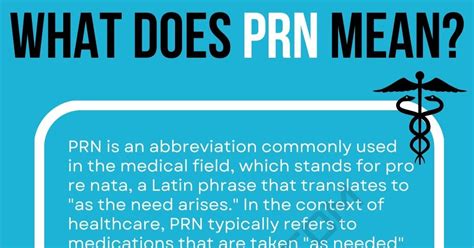Intro
Discover the ins and outs of PRN work with our expert guide. Learn about the benefits, pay rates, and flexibility of per diem nursing jobs, as well as the types of PRN work available, how to find PRN opportunities, and what skills are required to succeed in this in-demand field.
The world of healthcare is constantly evolving, and one trend that has gained significant attention in recent years is PRN work. Whether you're a seasoned healthcare professional or just starting your career, understanding the ins and outs of PRN work is essential. In this article, we'll delve into the world of PRN work, exploring its benefits, challenges, and everything in between.

What is PRN Work?
PRN, which stands for "pro re nata," is a Latin phrase that translates to "as needed." In the context of healthcare, PRN work refers to a type of employment arrangement where healthcare professionals work on an as-needed basis. This can include per-diem nursing, locum tenens, or temporary staffing arrangements. PRN work is often used to fill gaps in staffing, cover unexpected absences, or provide additional support during peak periods.
Benefits of PRN Work
PRN work offers a range of benefits for healthcare professionals, including:
- Flexibility: PRN work allows healthcare professionals to choose when and where they want to work, providing a better work-life balance.
- Autonomy: PRN workers are often able to choose their own assignments and work at their own pace.
- Variety: PRN work can provide exposure to different healthcare settings, patients, and experiences.
- Supplemental income: PRN work can be a great way to earn extra income, especially for those who want to work part-time or have a side hustle.
The Pros and Cons of PRN Work
While PRN work offers many benefits, it's not without its challenges. Here are some pros and cons to consider:

Pros:
- Flexibility and autonomy
- Opportunity to gain new experiences and skills
- Potential for higher pay rates
- Ability to choose when and where you work
Cons:
- Unpredictable schedules and income
- Lack of benefits and job security
- Potential for burnout and stress
- Limited opportunities for career advancement
Who is PRN Work Suitable For?
PRN work is suitable for a range of healthcare professionals, including:
- Nurses (RNs, LPNs, CNAs)
- Doctors (MDs, DOs)
- Allied health professionals (PTs, OTs, SLPs)
- Healthcare administrators

How to Get Started with PRN Work
If you're interested in exploring PRN work, here are some steps to get started:
- Update your skills and certifications: Make sure you have the necessary skills and certifications to work in your desired field.
- Create a profile: Create a profile on PRN staffing agencies or job boards to increase your visibility.
- Network: Network with other healthcare professionals and PRN staffing agencies to learn about opportunities.
- Be flexible: Be open to different assignments and schedules to increase your chances of getting hired.
Conclusion
PRN work is a flexible and rewarding career option for healthcare professionals. While it offers many benefits, it's essential to weigh the pros and cons and consider whether PRN work is suitable for your career goals and lifestyle. By understanding the ins and outs of PRN work, you can make informed decisions about your career and take the first step towards a more flexible and fulfilling work-life balance.
What is the difference between PRN and per-diem work?
+PRN and per-diem work are often used interchangeably, but PRN work refers to work that is done on an as-needed basis, while per-diem work refers to work that is done on a daily basis.
How do I get paid for PRN work?
+PRN workers are typically paid on an hourly or daily basis, and payment rates vary depending on the assignment and agency.
Can I work PRN and still have a full-time job?
+Yes, many healthcare professionals work PRN in addition to their full-time jobs to supplement their income or gain new experiences.
We hope this article has provided you with a comprehensive understanding of PRN work. Whether you're a seasoned healthcare professional or just starting your career, we encourage you to share your thoughts and experiences with PRN work in the comments below.
